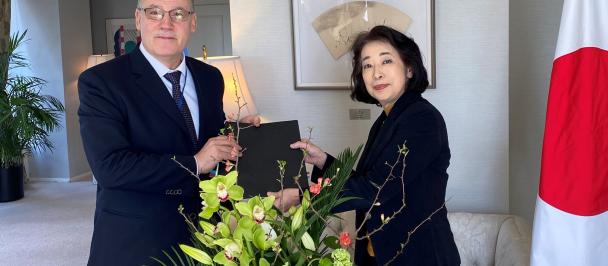Driving Sustainable Energy Transformation Norway and UNDP Support the Development of a Renewable Energy Master Plan for Syria
May 22, 2025

UNDP Syria Resident Representative, Mr Sudipto Mukerjee and the Minister of International Development of Norway, Mr Åsmund Aukrust sign a framework agreement to develop the renewable energy master plan for Syria
Damascus, 22 May 2025 – The Minister of International Development of Norway, Mr Åsmund Aukrust, and the United Nations Development Programme Resident Representative, Mr Sudipto Mukerjee signed a framework agreement to develop the renewable energy master plan for Syria.
“The political situation is fragile, which is precisely why it is important to start reconstruction efforts without delay and provide support to ensure that people have access to basic services. This study will be an important roadmap for how to build back better in the energy sector. The story of Syria is being written now, and Norway is seeking to play a constructive role,” said Minister of International Development Åsmund Aukrust.
Against the backdrop of Syria’s energy crisis, the plan will outline Syria’s future energy demand and determine the share renewable sources can meet. It will also include key measures such as reviewing existing regulations to align with international best practices and establishing a robust legal framework. Furthermore, the Plan will also define the priorities and human resources and capacities needed to ensure the regular updating of the plan by the different stakeholders.
Given the critical role of energy in Syria’s recovery, we have to rapidly address energy poverty and progressively accelerate the access to renewable energy. UNDP launched the Electricity Master Plan earlier this week. Norway’s contribution will support us in sustaining the momentum towards the properly planned and managed transition to clean and affordable energy for all”, said Sudipto Mukerjee, UNDP Resident Representative.

© UNDP Syria - Yahya Maraka
The Renewable Energy Master Plan, which will be developed over a 12-month period, identifies the following priority areas:
Increasing energy reliability and access for communities across Syria.
Reducing dependence on energy imports and enhancing energy security.
Promoting the sustainable and efficient long-term use of resources.
Minimising the risk of stranded assets while leveraging new technologies to foster emerging industries.
Minimising the risk of stranded assets, by avoiding unnecessary investments in outdated infrastructure that may no longer be viable in the transition to renewable energy and strategically leveraging new technologies.
Promoting positive economic impacts through job creation and local enterprise development.
Improving environmental sustainability and reducing greenhouse gas emissions.
Advancing more sustainable energy use across all sectors, promoting energy-efficient practices, and integrating renewable energy on both the supply and demand sides.
Clarifying the limitations of sustainable energy for the provision of some types of large-scale public service delivery.
Providing requirements and recommendations for integrating the current transmission and distribution network with the proposed renewable power interventions.
Establishing benchmarks and indicators to track progress towards renewable energy goals and creating a feedback model that promotes investment in renewable energy.
Identifying additional capacity needs of relevant authorities to formulate long- term energy plans and policies.
UNDP is scaling up its energy work to support Syria in achieving a just transition, and in advancing recovery, while tackling climate change.
It is worth noting that the plan will be integrated with the National Electricity Master Plan to ensure a cohesive and sustainable energy strategy that will 1) assess policies to enhance energy security and efficiency; 2) identify financial requirements and investment alternatives to meet demand forecasts; 3) assess renewable energy potential to identify and evaluate the renewable energy resources available in including solar, wind, and biomass; 4) develop a strategic framework; 5) promote stakeholder engagement; 6) provide a list of key priority programmes; 7) facilitate technical capacity building in renewable energy technologies and project management; and 8) establish partnerships with the academia to create a skilled workforce in the renewable energy sector.
Media contacts:
Dania Darwish | Communications Specialist | Syria Country Office | dania.darwish@undp.org

 Locations
Locations



